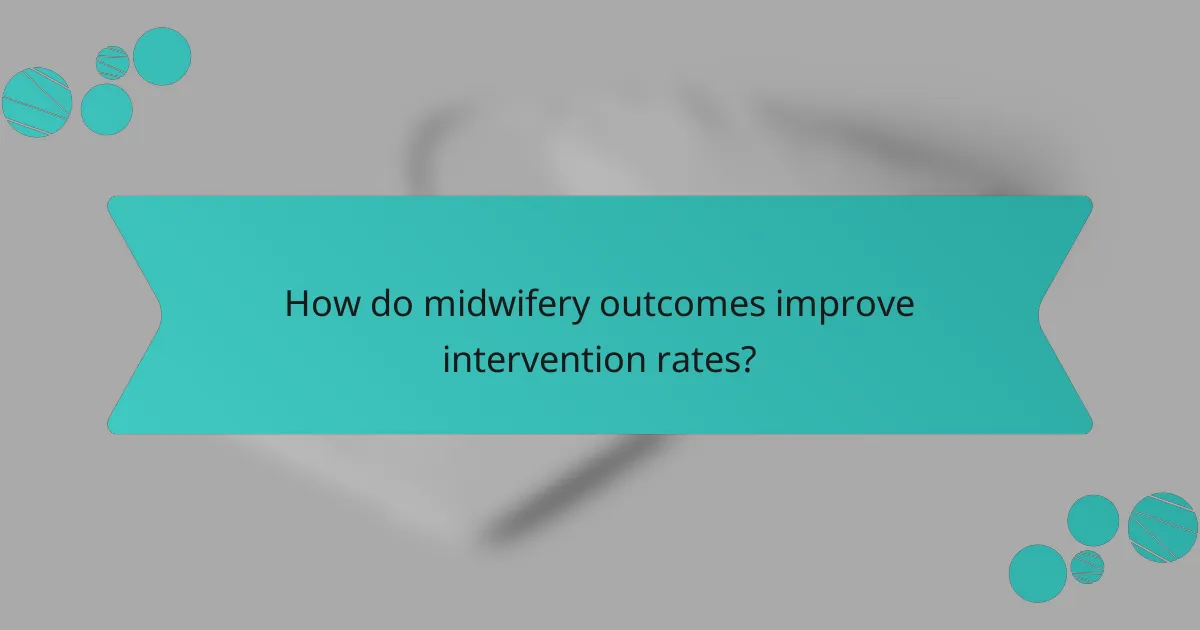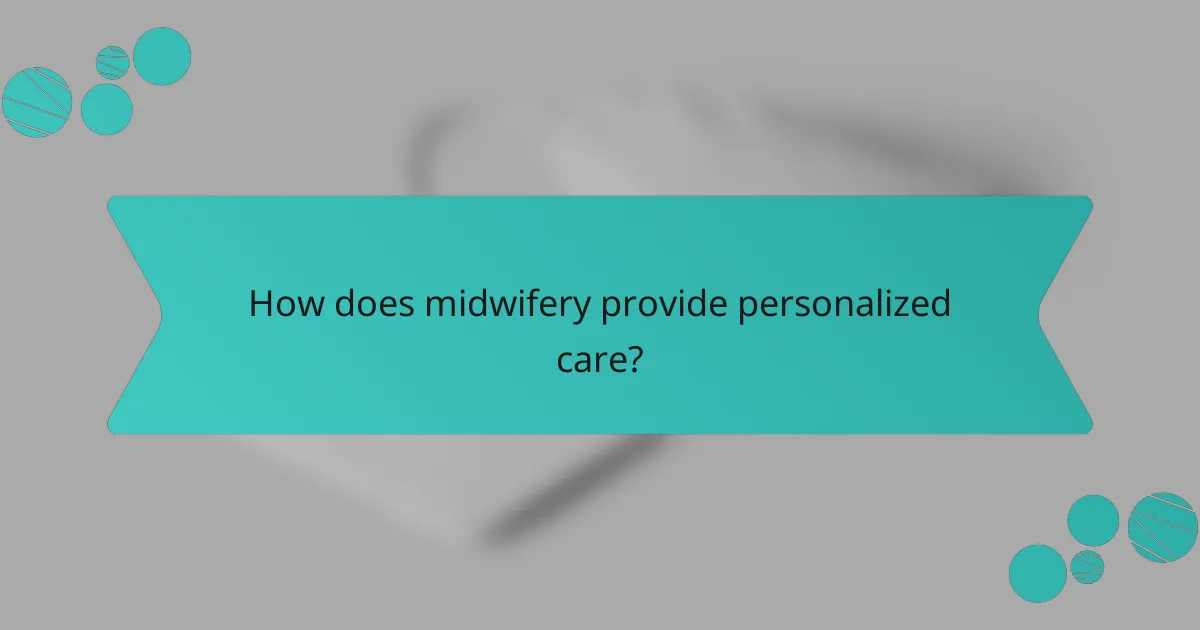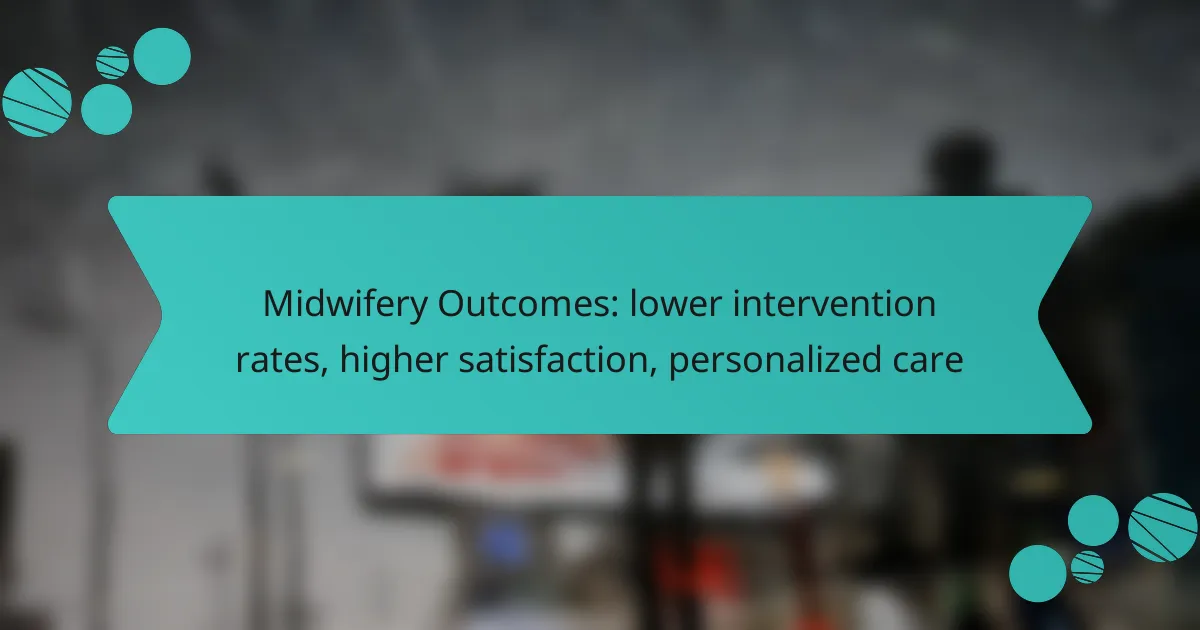Midwifery outcomes are characterized by lower intervention rates and higher satisfaction, achieved through a focus on personalized care and natural birth processes. By prioritizing the unique needs and preferences of each individual, midwifery fosters a supportive environment that enhances the overall birthing experience. This approach not only reduces the necessity for medical interventions but also promotes informed consent and continuous support, resulting in greater satisfaction for mothers and families.

How do midwifery outcomes improve intervention rates?
Midwifery outcomes significantly improve intervention rates by prioritizing natural birth processes and personalized care. This approach often leads to fewer medical interventions, resulting in a more satisfying experience for mothers and families.
Lower cesarean section rates
Midwifery care is associated with lower cesarean section rates compared to traditional obstetric care. This is largely due to the emphasis on continuous support during labor and the use of non-invasive pain management techniques, which can help facilitate vaginal births.
In many cases, midwives encourage mobility and alternative positions during labor, which can reduce the likelihood of complications that lead to cesarean deliveries. Studies suggest that midwifery-led care can lower cesarean rates to around 15-20%, compared to higher rates in standard hospital settings.
Reduced use of epidurals
Midwives often promote natural pain relief methods, which can lead to a reduced reliance on epidurals. Techniques such as breathing exercises, hydrotherapy, and massage are commonly used to manage pain effectively without the need for medication.
When epidurals are utilized, midwives typically discuss the potential risks and benefits, empowering women to make informed choices. This informed consent process can lead to a decrease in epidural usage, with some studies indicating rates as low as 20-30% in midwifery settings.
Fewer inductions
Midwifery care tends to result in fewer labor inductions, as midwives often support the natural onset of labor. They monitor the health of both mother and baby closely, allowing for a more individualized approach that respects the body’s natural timing.
Inductions can sometimes lead to a cascade of interventions, so midwives focus on minimizing unnecessary medical interventions. This approach can lead to induction rates that are significantly lower than the national average, which often hovers around 20-30% in conventional settings.

What factors contribute to higher satisfaction in midwifery care?
Higher satisfaction in midwifery care is primarily influenced by personalized approaches, continuous support, and a strong emphasis on informed consent. These factors create a supportive environment that respects the preferences and needs of the birthing person, leading to better outcomes and experiences.
Personalized birth plans
Personalized birth plans allow individuals to outline their preferences for labor and delivery, fostering a sense of control and ownership over the birthing process. Midwives work collaboratively with clients to create these plans, which can include preferences for pain management, positions during labor, and immediate postnatal care.
It is essential to communicate openly about desires and concerns when developing a birth plan. This ensures that the midwife can tailor the care to align with the individual’s values and expectations, ultimately enhancing satisfaction.
Continuous support during labor
Continuous support during labor significantly impacts the birthing experience, as it provides emotional and physical assistance throughout the process. Midwives offer reassurance, comfort measures, and advocacy, which can lead to lower intervention rates and a more positive experience.
Research suggests that having a dedicated support person, such as a midwife, can reduce the likelihood of cesarean sections and other medical interventions. This support can include techniques like breathing exercises, massage, and positioning guidance to help manage pain and anxiety.
Emphasis on informed consent
An emphasis on informed consent ensures that individuals understand their options and the implications of their choices during labor and delivery. Midwives prioritize clear communication, providing information about procedures, risks, and benefits to empower clients in their decision-making.
It is crucial for clients to feel comfortable asking questions and expressing concerns. This dialogue fosters trust and collaboration, which are vital for a satisfying midwifery experience. Engaging in informed consent practices can lead to better alignment between the care provided and the client’s expectations.

How does midwifery provide personalized care?
Midwifery offers personalized care by focusing on the unique needs and preferences of each individual throughout the pregnancy, birth, and postpartum journey. This approach enhances the overall experience, leading to lower intervention rates and higher satisfaction among mothers.
Individualized prenatal education
Individualized prenatal education involves tailoring information and resources to meet the specific needs of each expectant mother. Midwives assess factors such as health history, lifestyle, and personal preferences to create a customized education plan. This may include discussions on nutrition, exercise, and birthing options, ensuring that mothers feel informed and empowered.
For example, a midwife might provide resources on natural childbirth techniques for those interested, while also offering information on pain management options for those who prefer them. This personalized approach helps mothers make informed decisions that align with their values and circumstances.
Tailored postpartum support
Tailored postpartum support is crucial for new mothers as they transition into parenthood. Midwives offer personalized follow-up care that addresses physical recovery, emotional well-being, and infant care. This support can include home visits, breastfeeding assistance, and mental health resources, all designed to meet the unique needs of each family.
For instance, a midwife may schedule additional visits for mothers experiencing difficulties with breastfeeding or provide referrals to support groups for postpartum depression. This individualized attention fosters a supportive environment that promotes healing and confidence in new parents.
Holistic health assessments
Holistic health assessments in midwifery consider the physical, emotional, and social aspects of a mother’s well-being. Midwives conduct thorough evaluations that encompass not only medical history but also lifestyle factors, mental health, and support systems. This comprehensive approach allows for early identification of potential issues and personalized care plans.
For example, a midwife may recommend specific lifestyle changes or therapies based on a mother’s unique health profile, such as stress management techniques or nutritional adjustments. By addressing all facets of health, midwives help ensure a healthier pregnancy and postpartum experience.

What are the benefits of midwifery care in urban areas?
Midwifery care in urban areas offers lower intervention rates, higher satisfaction among mothers, and personalized care tailored to individual needs. This approach fosters a supportive environment that prioritizes natural birthing processes and holistic well-being.
Access to community resources
Midwives in urban settings often have strong connections to local community resources, which can enhance the overall care experience. These resources may include prenatal classes, lactation consultants, and mental health services, all of which contribute to a comprehensive support system for expectant mothers.
For example, midwives can refer clients to nearby parenting groups or nutritional counseling services, ensuring that families receive the necessary support throughout pregnancy and postpartum. Utilizing these community resources can lead to improved health outcomes and greater satisfaction with the care received.
Integration with local healthcare systems
Effective integration of midwifery care with local healthcare systems is crucial in urban areas. This collaboration allows midwives to work closely with obstetricians and pediatricians, ensuring that any complications are promptly addressed while maintaining a focus on personalized care.
Midwives can facilitate smooth transitions between different levels of care, such as referring patients to specialists when needed. This integrated approach not only enhances the safety of the birthing process but also empowers mothers by keeping them informed and involved in their care decisions.

How can expectant parents choose a midwife?
Expectant parents can choose a midwife by considering their qualifications, care philosophies, and hospital affiliations. This process involves evaluating the midwife’s experience, understanding their approach to childbirth, and ensuring they have appropriate connections with local healthcare facilities.
Assessing qualifications and experience
When selecting a midwife, it’s crucial to assess their qualifications and experience. Look for certifications from recognized organizations, such as the American Midwifery Certification Board (AMCB) in the U.S. or the Royal College of Midwives (RCM) in the UK. Experience in handling various birth scenarios can also indicate a midwife’s capability.
Consider asking potential midwives about their years of practice, the number of births they have attended, and any specialized training they may have. A midwife with a diverse background may be better equipped to handle unexpected situations during labor.
Understanding care philosophies
Understanding a midwife’s care philosophy is essential for ensuring that their approach aligns with your values and preferences. Some midwives emphasize natural childbirth and minimal interventions, while others may be more open to medical interventions if necessary. Discussing these philosophies can help you gauge compatibility.
Ask potential midwives how they handle pain management, emergencies, and postpartum care. This conversation can reveal their commitment to personalized care and how they prioritize the needs and desires of expectant parents.
Evaluating hospital affiliations
Evaluating a midwife’s hospital affiliations is important for understanding the level of support available during childbirth. Check if the midwife has privileges at a nearby hospital, as this can facilitate a smooth transfer in case of complications. It also indicates a collaborative relationship with medical staff.
Consider the reputation of the affiliated hospitals and their policies regarding midwifery care. Some hospitals may have specific guidelines that could impact your birthing experience, so it’s wise to research and discuss these aspects with your chosen midwife.

What are the emerging trends in midwifery care?
Emerging trends in midwifery care focus on enhancing patient outcomes through lower intervention rates, increased satisfaction, and personalized care. These trends include the integration of telehealth services, a stronger emphasis on mental health support, and the use of technology for monitoring health during pregnancy and childbirth.
Increased use of telehealth services
Telehealth services are becoming a vital part of midwifery care, allowing expectant mothers to consult with midwives remotely. This approach can reduce the need for in-person visits, making care more accessible, especially in rural areas or for those with mobility challenges.
Midwives can offer prenatal check-ups, education, and support through video calls or messaging platforms. This flexibility not only saves time but also enhances the overall experience by allowing women to receive care in the comfort of their homes.
Focus on mental health support
There is a growing recognition of the importance of mental health in midwifery care. Midwives are increasingly trained to identify and address mental health issues, such as anxiety and postpartum depression, which can significantly impact maternal and infant health.
Support can include counseling, referrals to mental health professionals, and creating a supportive environment where women feel comfortable discussing their emotional well-being. This holistic approach contributes to higher satisfaction rates among mothers.
Integration of technology in monitoring
Technology is playing a crucial role in monitoring maternal and fetal health. Wearable devices and mobile applications can track vital signs, contractions, and fetal movements, providing real-time data to midwives.
This integration allows for timely interventions when necessary and empowers women to take an active role in their care. By using technology effectively, midwives can ensure personalized care tailored to each woman’s unique needs.
